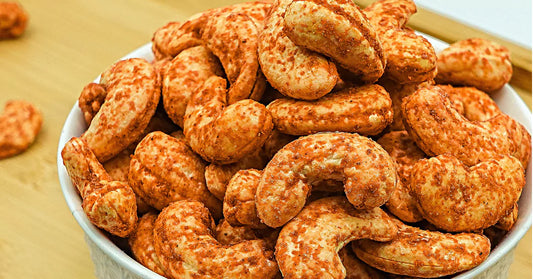Yes, it's generally safe to eat cashews when you have a cough. They may even provide some relief due to their nutritional properties. However, if you have a nut allergy or severe throat irritation, consult a doctor first.
Detailed answer:
Cashews are generally safe to consume when you have a cough. They contain nutrients that may support overall health during illness. The smooth texture of cashews is unlikely to irritate most throats. Some people find that cashews help soothe their throat and reduce cough symptoms. If you have a severe cough or throat irritation, start with a small amount to ensure they don't worsen your symptoms. Those with nut allergies should avoid cashews regardless of having a cough. If you're unsure, consult with a healthcare professional before adding cashews to your cough management routine.How exactly do cashews work to help with coughs?
Summary: Cashews may help with coughs due to their anti-inflammatory properties, high zinc content, and ability to boost the immune system. They also contain compounds that might help reduce throat irritation.
Detailed answer:
Anti-inflammatory properties: Cashews contain anacardic acids, which have anti-inflammatory effects that may help reduce throat irritation. Zinc content: Cashews are rich in zinc, a mineral known to support immune function and potentially reduce the duration of colds and coughs. Immune system boost: The nutrients in cashews, including vitamin C and E, can help strengthen the immune system. Throat-coating effect: The natural oils in cashews may provide a soothing effect on the throat, potentially reducing cough triggers. Antioxidant properties: Cashews contain antioxidants that can help protect cells from damage caused by free radicals during illness. Magnesium content: The magnesium in cashews may help relax muscles, potentially easing cough symptoms. Protein source: The protein in cashews can support overall health and recovery during illness.Are there specific types of cashews better for coughs?
Summary: Raw, unsalted cashews are generally considered the best option for coughs. They retain more nutrients and lack additives that might irritate the throat. However, individual preferences may vary.
Detailed answer:
Raw cashews: Retain more nutrients No added salt or oil that might irritate the throat May have a milder flavor Dry roasted cashews: Still nutritious, but may have slightly fewer heat-sensitive nutrients No added oil, which can be beneficial for some May have a more pronounced flavor that some find pleasant Oil-roasted cashews: Can be more flavorful Added oil may provide extra throat-coating effects Higher in calories, which may not be ideal for everyone Salted cashews: Not recommended for coughs as salt can be dehydrating May irritate an already sensitive throat Flavored cashews: Avoid for coughs as added spices or flavors might be irritating Exception: Honey-flavored cashews might provide additional soothing effectsHow many cashews should I eat for a cough, and how often?
Summary: There's no standard dosage for using cashews to treat coughs. Start with a small handful (about 1 ounce or 28 grams) 1-2 times daily. Adjust based on your symptoms and tolerance, but avoid overconsumption.
Detailed answer:
Initial serving: Start with 1 ounce (about 18-20 cashews) per day. Frequency: Consume this serving once or twice daily. Timing: Consider having cashews between meals or as a light snack. Duration: Continue for a few days to assess effectiveness. Adjustment: Increase or decrease the amount based on your symptoms and how you feel. Maximum intake: Avoid consuming more than 3 ounces (about 85 grams) per day to prevent potential side effects. Consistency: Regular, moderate consumption may be more beneficial than sporadic large amounts. Individual factors: Consider your overall diet, calorie needs, and any existing health conditions when determining your intake.Can cashews replace cough medicine, or should I use them alongside it?
Summary: Cashews should not replace prescribed cough medicine. They can be used as a complementary approach alongside conventional treatments. Always consult your healthcare provider before making changes to your cough management strategy.
Detailed answer:
Complementary approach: Use cashews as a supplement to, not a replacement for, conventional cough treatments. Consult healthcare providers: Always discuss the use of cashews or any natural remedies with your doctor. Medication interactions: Some nutrients in cashews might interact with certain medications, so professional advice is crucial. Severity matters: For mild coughs, cashews might provide some relief, but severe or persistent coughs require medical attention. Holistic approach: Consider cashews as part of a broader health strategy that includes proper hydration, rest, and appropriate medical care. Monitor effectiveness: If using cashews alongside cough medicine, pay attention to any changes in your symptoms. Individual response: Remember that natural remedies like cashews may work differently for different people.Alternatives for those with nut allergies
Summary: If you have a nut allergy, avoid cashews. Alternative foods that may help with coughs include honey, ginger, turmeric, and pineapple. Always consult an allergist or healthcare provider before trying new foods for cough relief.
Detailed answer:
Honey: Known for its soothing properties and potential to suppress coughs. Ginger: Has anti-inflammatory properties and may help relieve throat irritation. Turmeric: Contains curcumin, which has anti-inflammatory and antioxidant properties. Pineapple: Contains bromelain, an enzyme with anti-inflammatory effects. Licorice root: May help soothe the throat and reduce cough symptoms. Marshmallow root: Can create a protective coating in the throat. Thyme: Has antimicrobial properties and may help relax the muscles of the trachea. Lemon: Rich in vitamin C and may help boost the immune system. Garlic: Has antimicrobial properties and may support immune function.What to do if cashews aren't helping your cough
Summary: If cashews aren't improving your cough, consider other remedies or consult a healthcare provider. Your cough might require medical attention, especially if it persists or worsens over time.
Detailed answer:
Reassess your symptoms: Determine if your cough has changed or worsened. Try other natural remedies: Consider alternatives like honey, ginger, or herbal teas. Increase hydration: Ensure you're drinking enough water to help thin mucus. Use a humidifier: Adding moisture to the air may help relieve cough symptoms. Over-the-counter medications: Consider appropriate cough suppressants or expectorants. Rest: Ensure you're getting adequate sleep to support your immune system. Consult a healthcare provider: If your cough persists for more than a few weeks or is accompanied by other symptoms, seek medical advice. Evaluate environmental factors: Consider if allergens or irritants in your environment might be contributing to your cough.Potential side effects of using cashews for a cough
Summary: While generally safe, excessive cashew consumption can lead to weight gain, digestive issues, and potential nutrient imbalances. Those with nut allergies should avoid cashews entirely. Always consume in moderation.
Detailed answer:
Weight gain: Cashews are calorie-dense, and overconsumption can lead to weight gain. Digestive issues: Eating too many cashews may cause bloating, gas, or constipation in some individuals. Allergic reactions: Those with nut allergies may experience severe reactions and should avoid cashews. Medication interactions: Cashews may interact with certain medications, particularly those affecting blood clotting. Kidney stones: The high oxalate content in cashews might increase the risk of kidney stones in susceptible individuals. Nutrient imbalances: Overconsumption may lead to imbalances in nutrients like manganese. Throat irritation: In rare cases, cashews might irritate an already sensitive throat. Acne breakouts: Some people may experience acne flare-ups due to the high fat content in cashews.Can cashews help with other cold or flu symptoms?
Summary: Cashews may offer some benefits for cold and flu symptoms due to their nutritional profile. They can support immune function, provide energy, and potentially help with inflammation. However, they are not a cure for these conditions.
Detailed answer:
Immune support: The zinc and vitamin C in cashews can help boost the immune system. Energy provision: The healthy fats and proteins in cashews can provide sustained energy during illness. Inflammation reduction: Cashews' anti-inflammatory properties may help alleviate some symptoms. Antioxidant effects: The antioxidants in cashews can help combat oxidative stress during illness. Nutrient density: Cashews provide various nutrients that support overall health during recovery. Potential fever reduction: Some compounds in cashews may have mild fever-reducing properties. Digestive support: The fiber in cashews can help maintain digestive health during illness. Mood enhancement: The tryptophan in cashews may help improve mood, which can be beneficial when feeling unwell.Is it safe to eat cashews for a cough during pregnancy?
Summary: Cashews are generally safe during pregnancy and may help with cough symptoms. However, consume them in moderation and always consult your healthcare provider before using any remedy during pregnancy.
Detailed answer:
Nutritional benefits: Cashews provide essential nutrients beneficial during pregnancy. Moderation is key: Consume cashews in moderate amounts to avoid excessive calorie intake. Allergies: If you have a history of nut allergies, avoid cashews during pregnancy. Salt content: Choose unsalted cashews to avoid excess sodium intake. Digestive concerns: Some pregnant women may experience digestive discomfort with nuts. Medication interactions: Check with your doctor about potential interactions with prenatal vitamins or other medications. Alternative remedies: Discuss other safe cough remedies with your healthcare provider. Pasteurization: Ensure cashews are properly processed to avoid any risk of foodborne illness.













